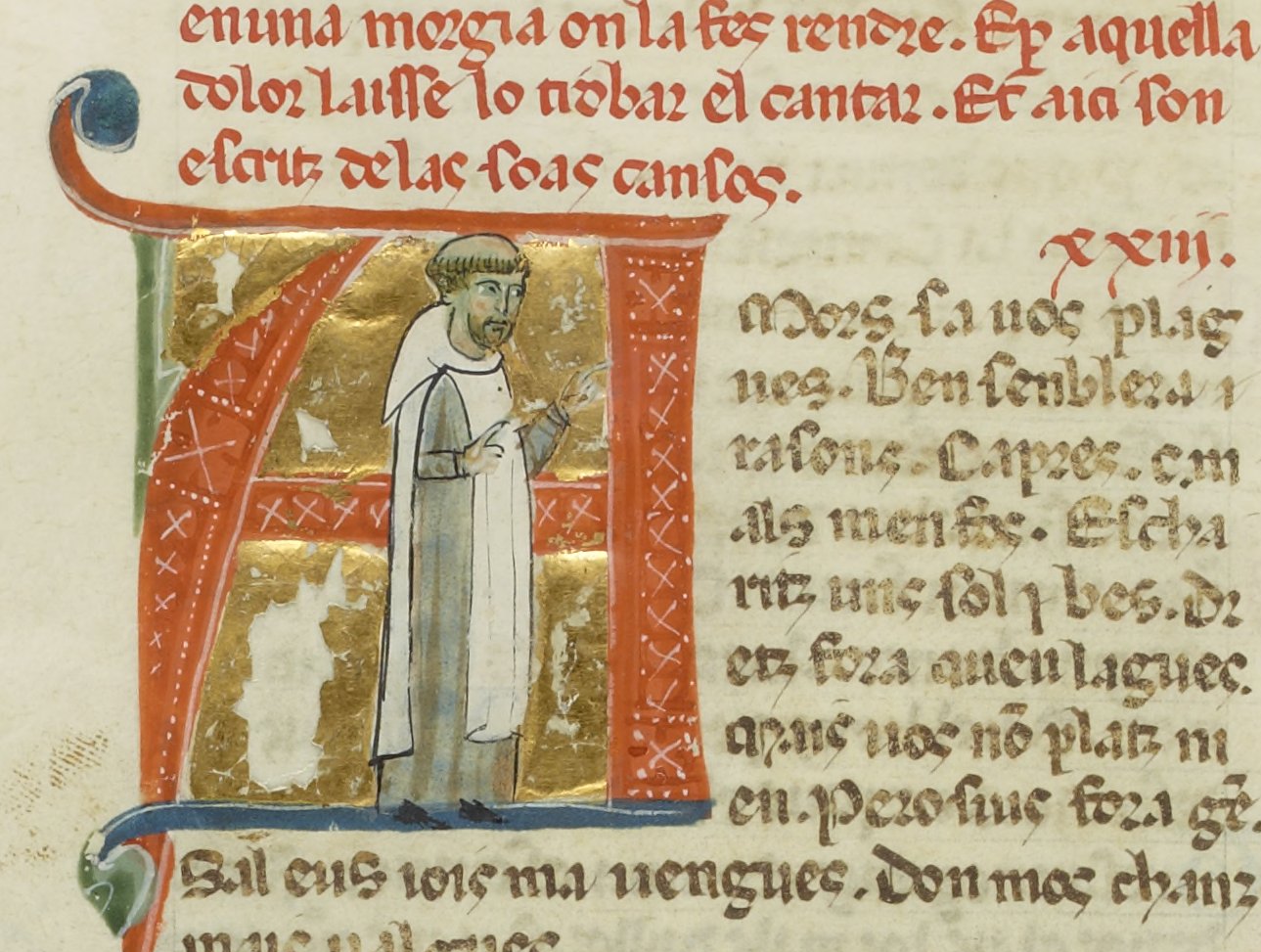Gaubert De Puicibot on:
[Wikipedia]
[Google]
[Amazon]

 Jausbert de Puycibot was a
Jausbert de Puycibot was a
Review
of ''Les Poésies de Jausbert de Puycibot'' by William P. Shepard in ''Modern Language Notes'', Vol. 41, No. 3. (Mar., 1926), pp. 197–200. *Chambers, Frank M
"On the Attribution of a Provençal Poem."
''Modern Language Notes'', Vol. 62, No. 5. (May, 1947), pp. 320–322. *Jenkins, T. Atkinson
"On Newness in the Novel."
''PMLA'', Vol. 41, Appendix. (1926), pp. xliii-lix. *Shepard, William P
"A Provençal ''Débat'' on Youth and Age in Women."
''Modern Philology'', Vol. 29, No. 2. (Nov., 1931), pp. 149–161. {{DEFAULTSORT:Jausbert De Puycibot 13th-century French troubadours Year of death unknown Year of birth unknown People from Limousin

 Jausbert de Puycibot was a
Jausbert de Puycibot was a Limousin
Limousin (; oc, Lemosin ) is a former administrative region of southwest-central France. On 1 January 2016, it became part of the new administrative region of Nouvelle-Aquitaine. It comprised three departments: Corrèze, Creuse, and Haute-Vienn ...
troubadour
A troubadour (, ; oc, trobador ) was a composer and performer of Old Occitan lyric poetry during the High Middle Ages (1100–1350). Since the word ''troubadour'' is etymologically masculine, a female troubadour is usually called a ''trobairi ...
of the early thirteenth century ( fl. 1220–1231). Fifteen of his works have survived (fourteen of them ''cansos
The ''canso'' or ''canson'' or ''canzo'' () was a song style used by the troubadours. It was, by far, the most common genre used, especially by early troubadours, and only in the second half of the 13th century was its dominance challenged by a ...
''), most of them conventional, but with a few that are expressive of "true feeling". According to some sources, Jausbert was a monk
A monk (, from el, μοναχός, ''monachos'', "single, solitary" via Latin ) is a person who practices religious asceticism by monastic living, either alone or with any number of other monks. A monk may be a person who decides to dedica ...
, ''lo Monge de Poicibot''.
The poem ''S'eu vos voill tan gen lauzar'' had long been attributed to him, though doubts have arisen due to its appearance in a collection of poems by the Monge de Montaudo. He probably wrote the ''sirventes
The ''sirventes'' or ''serventes'' (), sometimes translated as "service song", was a genre of Old Occitan lyric poetry practiced by the troubadours.
The name comes from ''sirvent'' ('serviceman'), from whose perspective the song is allegedly wr ...
'' (servant song) that, together with another by Bertran de Preissac, forms a ''tenso
A ''tenso'' (; french: tençon) is a style of troubadour song. It takes the form of a debate in which each voice defends a position; common topics relate to love or ethics. Usually, the tenso is written by two different poets, but several examples ...
'' (dispute) in which the two troubadours debate the merits of old and young women. Jausbert supports ''las joves'' (the youth), while Bertran ''las vielhas'' (the aged).
''Era quan l'ivernz nos laissa''According to one of the novellas in the ''Flores novellarum'' of Francesco da Barberino, Jausbert bumped into his neglected wife while visiting a brothel.Jenkins, lv. Jausbert's works was first edited and published by William P. Shepard under the title ''Les Poésies de Jausbert de Puycibot'' (Paris, 1924).
''E par la fuoilla en la vaissa''
''E il lauzellet chanton c'uns no s'en laissa,''
''Fas sirventes ses biaissa,''
''Mas uns malastrucs m'afaissa,''
''Car ab joves no.s te: Dieus li don aissa!''
''Mais pretz una vieilla saissa''
''Que non a ni carn ni craissa.''
''Mal ai' er el os e daval la madaissa!''
''Que la genta, covinenta, on bos pretz s'eslaissa,''
''Fina, francha, frescha, blancha, don jois no.s biaissa,''
''Mais la vuoill, si gen m'acuoill ni josta se m'acaissa,''
''Que la rota, que.m des tota Limoges e Aissa.''
. . . . . . . . .
''En Bertranz men com afacha. . .''
''E volria n'agues la testa fracha!''
''Pois parlar l'aug del manjar ni de bon' osta.l tracha,''
''Al jazer compra.l ben ser, tot lo porc e la vacha,''
''Quar s'embarga en la pel larga, que es molla e fracha.''
''Semblanz es, quant hom l'ades, qu'anc no.n trais sa''
''garnacha.''
. . . . . . . . .
''E tenc m'a gran desmesura''
''Que, pois domna desfegura,''
''Quar ja i fai muzel ni armadura.''
''Mas prezes de si tal cura''
''Per que l'arm' estes segura,''
''Que.l cors desvai a totz jorns e pejura.''
''Eu lor dic aquest prezic per gran bonaventura.''
''En Bertran vei a lor dan, e par que, per fraichura,''
''Cad' aver las! i esper e soffre et abdura.''
Notes
Sources
*Adams, Edward LReview
of ''Les Poésies de Jausbert de Puycibot'' by William P. Shepard in ''Modern Language Notes'', Vol. 41, No. 3. (Mar., 1926), pp. 197–200. *Chambers, Frank M
"On the Attribution of a Provençal Poem."
''Modern Language Notes'', Vol. 62, No. 5. (May, 1947), pp. 320–322. *Jenkins, T. Atkinson
"On Newness in the Novel."
''PMLA'', Vol. 41, Appendix. (1926), pp. xliii-lix. *Shepard, William P
"A Provençal ''Débat'' on Youth and Age in Women."
''Modern Philology'', Vol. 29, No. 2. (Nov., 1931), pp. 149–161. {{DEFAULTSORT:Jausbert De Puycibot 13th-century French troubadours Year of death unknown Year of birth unknown People from Limousin